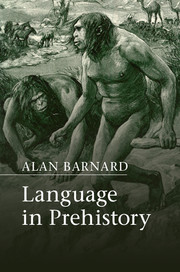Book contents
- Frontmatter
- Dedication
- Contents
- List of figures
- List of tables
- Preface
- 1 Introduction
- 2 Population diversity and language diversity
- 3 What did prehistoric people do?
- 4 How did prehistoric people think?
- 5 Narratives of the every-day
- 6 Mythological narratives
- 7 Sexual selection and language evolution
- 8 Conclusions and thoughts for the future
- Glossary
- References
- Index
8 - Conclusions and thoughts for the future
Published online by Cambridge University Press: 05 November 2015
- Frontmatter
- Dedication
- Contents
- List of figures
- List of tables
- Preface
- 1 Introduction
- 2 Population diversity and language diversity
- 3 What did prehistoric people do?
- 4 How did prehistoric people think?
- 5 Narratives of the every-day
- 6 Mythological narratives
- 7 Sexual selection and language evolution
- 8 Conclusions and thoughts for the future
- Glossary
- References
- Index
Summary
When I was a boy I invented a language. I do not know why, but for some reason I called it Vieth. I knew that the vowel (or vowels) might prove difficult to pronounce and that the v and the th might cause similar problems for non-English-speakers. I guess I was about eight years old at the time, and certainly knew no click languages or I might have tried to work clicks in as well. Nor did I know any other languages at all then; and really, I still cannot speak anything else fluently, apart from my native English. A smattering of foreign words and phrases were in the back of my head in those days, and a few bilingual dictionaries were in the house. I loved grammar, it seems, so I set about trying to concoct the most difficult grammar I could, with bits and pieces from all the languages that came to mind. Apparently, such an effort is not unknown to science, though it is more common in science fiction. It has probably been around since Babel, as indeed writers like Arika Okrent (2000) and Michael Adams (2011: 1–16) imply.
The point of this story is that I may not have been at all unique. Nor is this common only in science (or science fiction). In many, many other societies through the millennia, languages are invented, diverge from existing languages, build new and complicated grammars, then mix with other languages through conquest or intermarriage. The process is repeated time and time again. Languages are simplified through the development of pidgins, and then as creoles appear they grow complex again. I had grown up in an essentially monolingual environment while nevertheless being exposed to a surrounding world where other languages were indeed being spoken. Children everywhere invent and reinvent. They do this to show cleverness, to fool each other and to fool adults. And when more languages are all around, it must be much easier. Language for me as a child was a game, and I would assume it is a game at least for some other children as well.
- Type
- Chapter
- Information
- Language in Prehistory , pp. 121 - 135Publisher: Cambridge University PressPrint publication year: 2016



